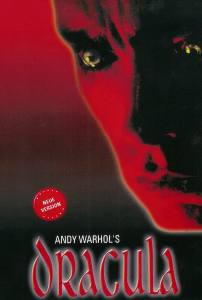
|
Derzeit online |
||
|
386
|
Filme | |
|
125
|
Bücher | |
|
34
|
Biographien | |
|
50
|
Hörspiele | |
|
|
||

![]()
| Blood
for Dracula AKA: Young Dracula, Andy Warhols Young Dracula, Dracula, Andy Warhol's Dracula
The Dracula Clan is experiencing great difficulties, as they urgently need virgin blood to keep up their vampire existence. Morrisseys somehow weird vampires cannot digest the blood of sexually experienced women. The problem is that virgins have become rare in Rumania of the 20th century this being the reason why Count Dracula, the last of his kind after the "death" of his beloved sister, and his assistant Anton decide to travel to Italy, where people are said to be very religious and the fair sex is brought up in chastity. What a false reasoning! Dracula, who by the way, once more walks around in bright daylight (or respectively rolls around in is wheelchair when he is too weakened), takes crucifixes off the walls by himself, eats vegetarian food and even drinks wine is warmly welcomed by the family of the Count di Fiori. Being impoverished aristocrats they consider Dracula a potential rich husband in accordance with their rank for one of their four daughters. The pretended big spender is surely up to something completely different. But we all know this: when times are bad, it always gets worse. The two Fiori daughters Saphira as Rubinia assure the count that they are still virgins, whereupon Dracula greedily sets on them. But this time he had back luck, both of them having for a long time experienced the exchange of body fluids with the sexy servant Mario, a devoted socialist, who from the very beginning is suspicious towards Dracula. After having consumed the "impure" blood the poor vampire who has already suffered so much has to puke as hell. Left in a weakened condition there's only the 14 year old Perla left for supper, but also in this case Mario has been faster, deflowering Perla for the sake of her own protection. He has long ago seen through Dracula's real character and hunts him with down with ax and pale.
In the Grande finale first Dracula's servant Anton dies, followed
by the Comtessa Di Fiori, then it's Esmeralda's turn and in the
end the Count himself encounters his death, after having been dismembered
with an ax (in a scene that very much reminds us of "Monty
Python's Holy Grail") before the pale is being rammed in his
heart. Note: we have just witnesses a scene of profound symbolism:
It's the victory of the working class over the noble blood sucker.
The reviewer shouts out in dismay: rubbish, nonsense of the worst kind! This is surely one of the most unusual movies bearing the name "Dracula" in its title (and we mean unusual not in the positive sense) next to another name being Andy Warhol. Well - the only thing Warhol had to do with this movie was giving the authorization to use his name in its title, quite different from the predecessor "Andy Warhol's Frankenstein", also put in scene by Factory film maker Paul Morissey with Udo Kier and Joe Dallessandro in the leads, where Warhol was still the executive producer. The funny thing is that the shooting for "Andy Warhol's Dracula" was started the very day "Frankenstein" was completed, crew and cast being nearly the same. Well, the motivation was great but the budget was low. There's rumors saying that co-director Anthony M. Dawson, took over the responsibility for the staging, which seems quite possible when you have a closer look at the style and make of this cocktail of sex and violence. If the one or other who has watched this movie is now wondering Sex? Violence? it has to be said that there's different more or less cut version of this movie, some of them being completely soft. Sure, there's one or two original ideas. Udo Kier is doing a great job when playing his role as Count Dracula (by the way: he's the only one in this movie) and it's quite sad that he has fewer scenes than the bare behind of Joe Dallessandro, a beaux and wanna-be-actor coming from the Warhol surroundings, which is quite characteristic for this movie. Even if this might sound quite trashy, the movie is not at all as entertaining as it appears. And today the movie isn't as "provocative" and "shocking" as it might have been in the 70s anymore - the only shocking thing is how Morrissey deformed Bram Stokers themes. If
anybody still feels the urge to watch this movie he should watch
the original English version and enjoy the funny accents of the
actors.
|
|||||||||||||||||||||||||||||||||||||||
|
|||||||||||||||||||||||||||||||||||||||




